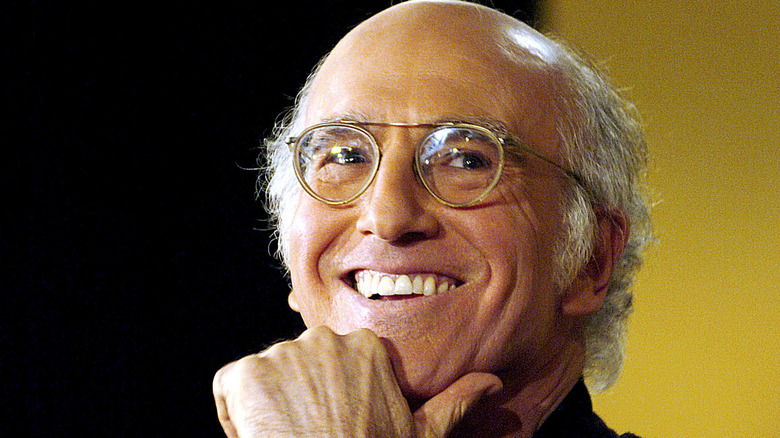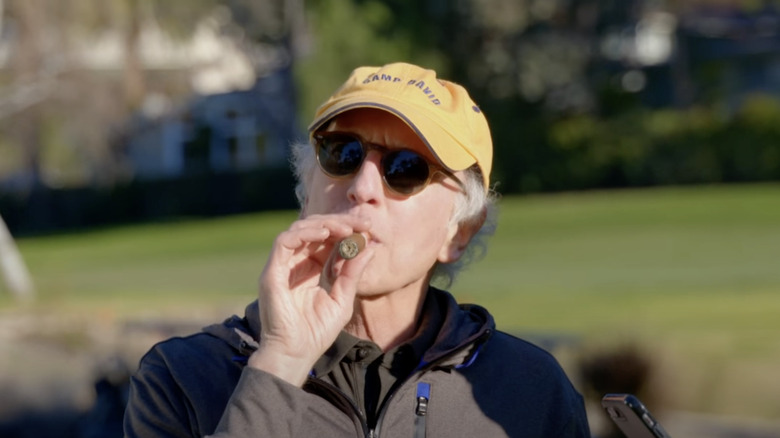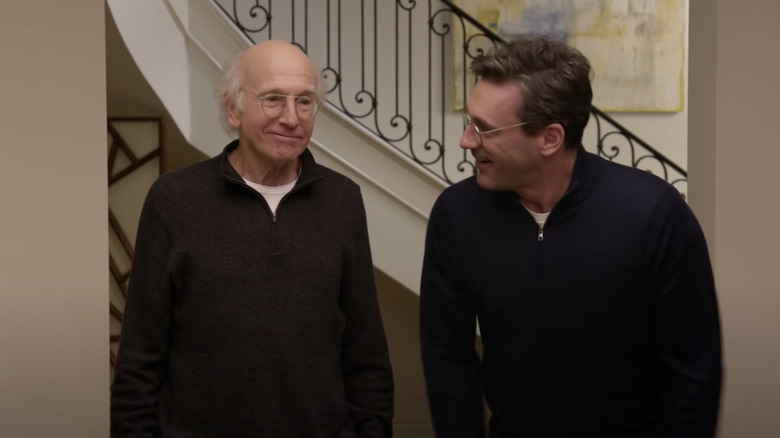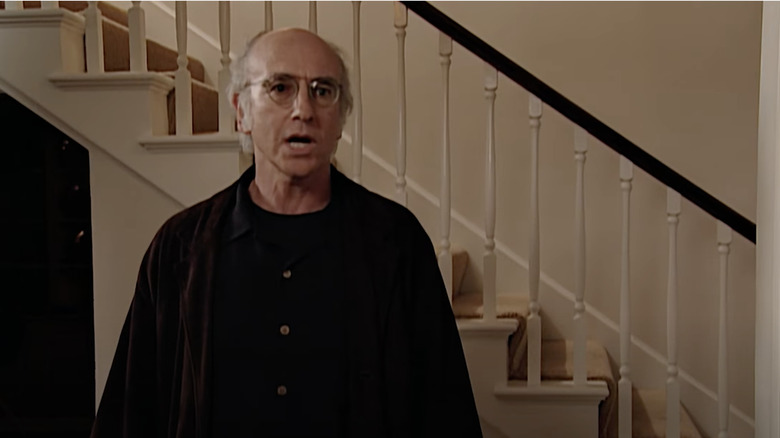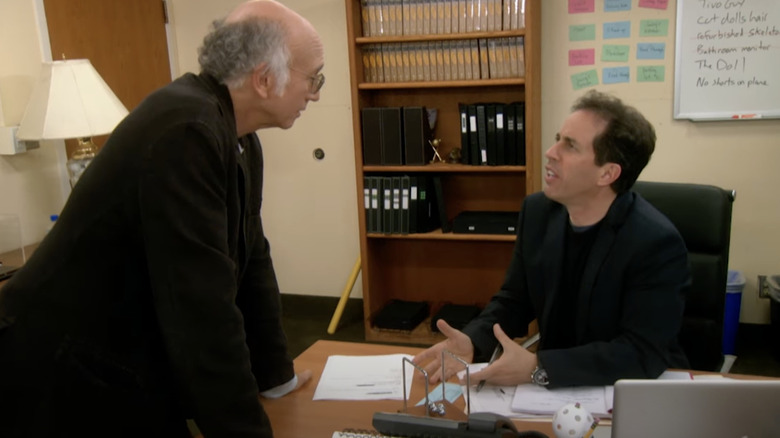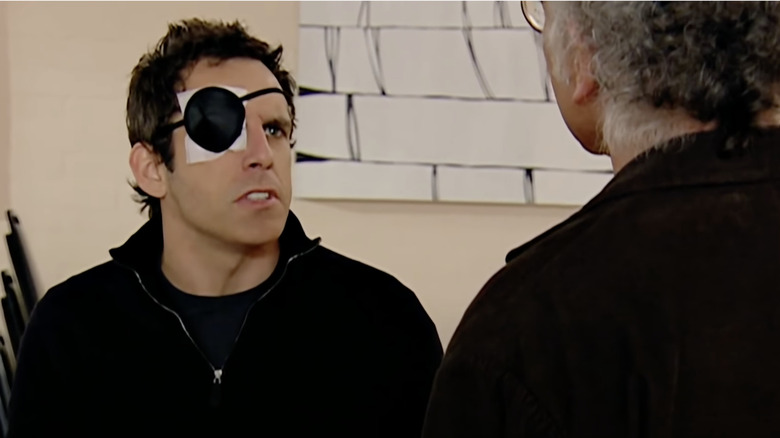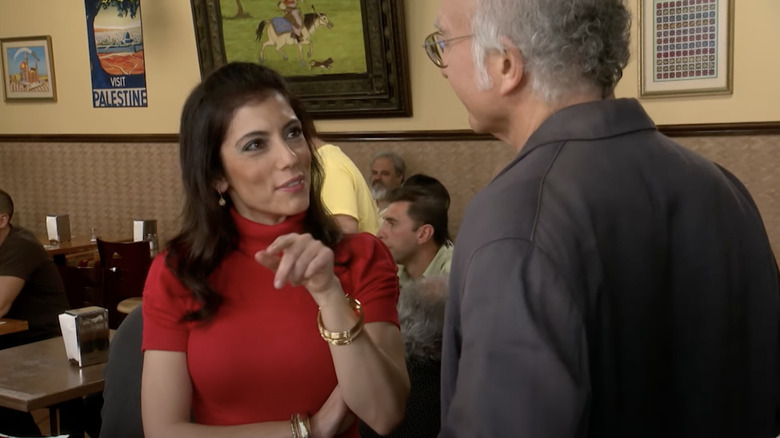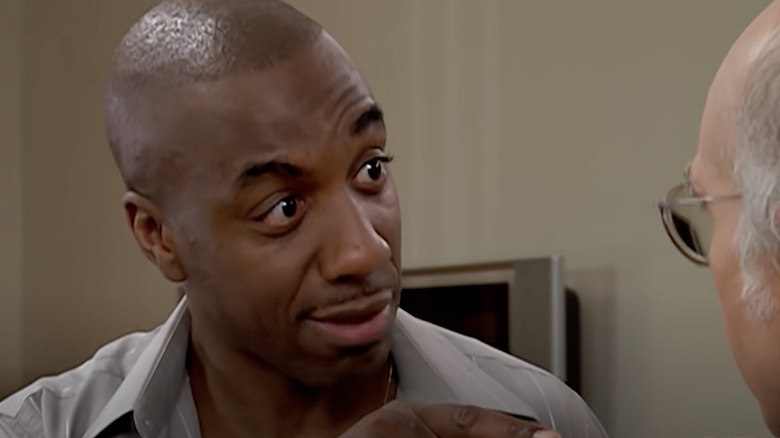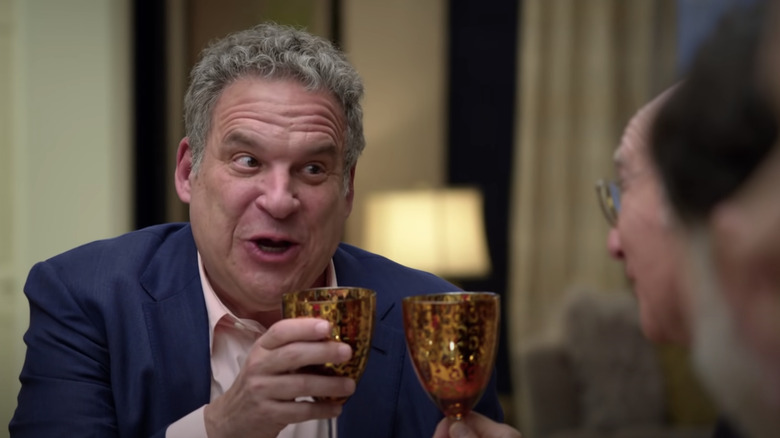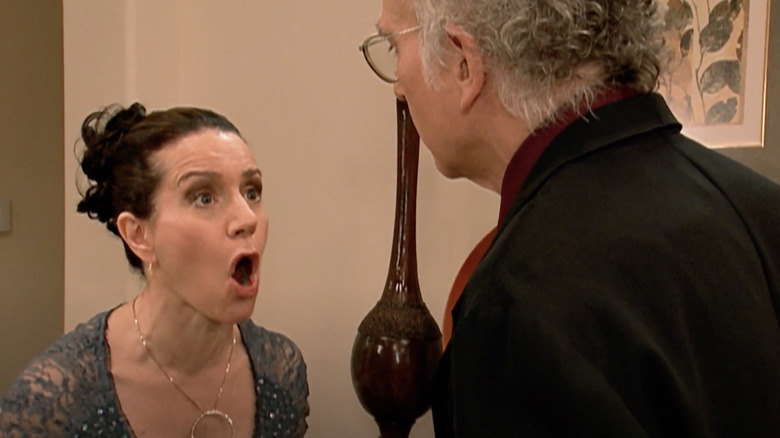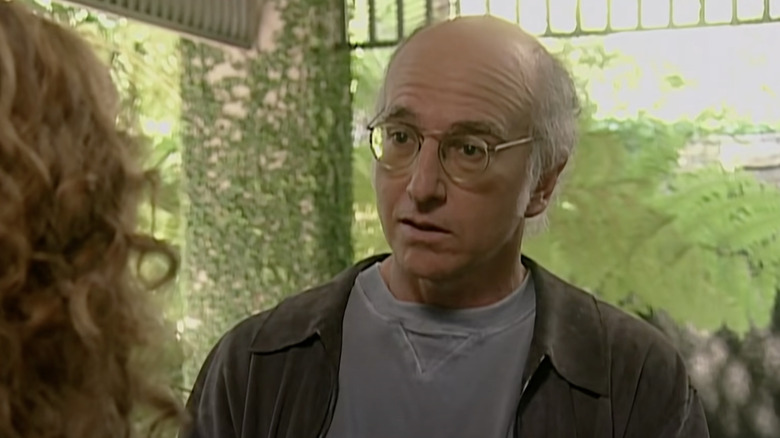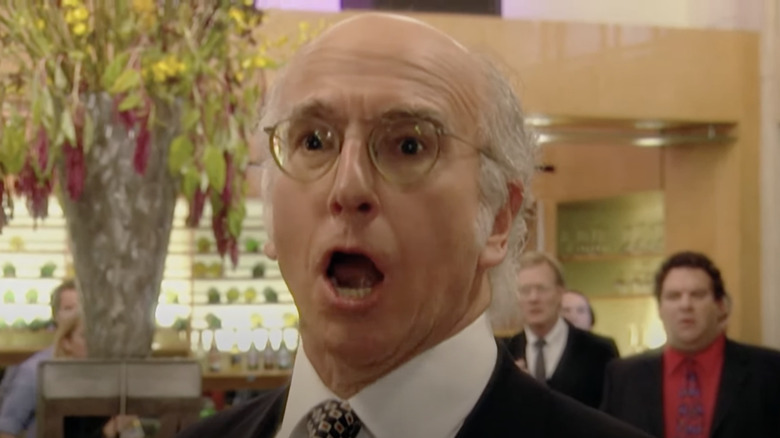Every Curb Your Enthusiasm Season Ranked Worst To Best
Comedy writer Larry David co-created "Seinfeld," one of the most acclaimed and popular sitcoms in television history. That alone would be enough to enter him into the comedy pantheon, but David was not done yet. In 1999, he released an HBO special called "Curb Your Enthusiasm," which mixed footage of his current standup comedy tour with improvised vignettes showing his life on the road. That special led to a full series that premiered on HBO in 2000. David ditched the standup angle and focused on the home life of "Larry David," a thinly fictionalized version of himself, co-starring Cheryl Hines as his wife Cheryl, Jeff Garlin and his agent Jeff, Susie Essman as Jeff's furious wife Susie, and a host of David's famous friends riffing on their own images.
One season of "Curb" led to another, and soon the show was celebrating its 11th season in 2021. The key to the show's longevity lies in its endlessly repeatable formula, where Larry and company are presented with an awkward social situation that doubles as a kind of moral test, one that he more often than not fails in some spectacularly public fashion. At its best, entire seasons of "Curb" hum along with the kind of perfectly calibrated twists, turns, and ironic punishments that made "Seinfeld" famous, only with more swearing.
Here are the 11 seasons of "Curb Your Enthusiasm," ranked from worst to best.
Season 9
Even a show as great as "Curb" has to have a bum note or two, and sadly Season 9 fits that bill. Premiering in 2017 after a six-year hiatus, there's a definite sense of shaking off the cobwebs and adjusting to a new era. That feeling of catching up with things permeates the season's two main serialized plots: Larry's doomed musical about Salman Rushdie and the wedding of Jeff and Susie's daughter Sammi (Ashly Holloway). The musical, based on the fatwa issued against Rushdie by Ayatollah Khomeini in the 1980s, results in Larry himself getting fatwa'd by a group of Muslim clerics; the only way they will call off the fatwa is if Larry gets "Hamilton" star Lin-Manuel Miranda to star in the musical. Miranda plays himself, and it's no surprise that the enthusiastic theatre kid turns out to be a controlling egomaniac.
Sammi, meanwhile, was an angry teenager when last seen in Season 8; now she is a young woman with an Army veteran fiancé. Larry, of course, causes a stir when he fails to thank the young man for his service. The two plots converge in typical "Curb" fashion at Sammi's wedding, but without the madcap spark of the best seasons.
Season 10
Another significant hiatus–three years–separated Season 9 from Season 10, which premiered in 2020. Overall, though, this season fares better thanks to some fantastic and unexpected guest stars, plus an all-time great serialized plot: The spite store. After Larry is banned from the new coffee shop run by his Season 7 nemesis Mocha Joe (Saverio Guerra), Larry decides to open a coffee shop of his own, Latte Larry's, in the same strip mall to put Mocha Joe out of business. He and Leon (JB Smoove) go to considerable lengths of time, effort, and expense to open not just a coffee spot, but the coffee spot–well, at least the ultimate spot for someone with Larry's particular neuroses, complete with specially designed splash-proof urinals.
The season sees the return of Kaitlin Olson as Cheryl's sister Becky, not seen since Season 6, and the introduction of Vince Vaughn as heretofore unknown Funkhouser brother Freddy, stepping in for the late, great Bob Einstein. Professional handsome men Timothy Olyphant and Jon Hamm make their "Curb" debuts here as well, Olyphant as a groom whose destination wedding goes awry, and Hamm as himself, studying Larry (perhaps too closely) for an upcoming film. The dinner party scene in which the hostess must contend with essentially two Larry Davids is a series highlight.
Season 1
Many television shows, especially comedy shows, take some time to find their voice, which can make revisiting the early episodes a little jarring. The first season of "Parks and Recreation," for instance, is a much different show than what came after. "Curb," however, arrived pretty much fully formed. Part of that is due to the show having a structure not terribly different from what David had honed to perfection on "Seinfeld," in which a foible, faux pas, little white lie, or missed social cue spirals into chaos. Later seasons of "Curb" would hit those "Seinfeld"-ian heights, but the raw materials are very much there in Season 1, from Richard Lewis (playing himself) and his revolving-door dating life, to Larry and Cheryl's frenemy couple Ted Danson and Mary Steenburgen, to Cheryl's credulity-straining tolerance for Larry's shenanigans.
Those shenanigans benefitted from HBO's anything-goes take on content and language, giving David a freedom to express himself that would have been unthinkable in the days of "master of your domain." And while dirtier doesn't always mean funnier, on "Curb" it very much does, whether that's a barrage of profane insults from Susie or the worst typo imaginable in Cheryl's aunt's obituary.
Season 7
David had left "Seinfeld" at the end of Season 7, but returned to write the controversial finale two years later in 1998. Eleven years later, David took a second crack at ending "Seinfeld" once and for all in Season 7 of "Curb," which concerns Larry and Jerry Seinfeld putting together a reunion special. It's a hall of mirrors conceit, with Seinfeld, Julia Louis-Dreyfus, Jason Alexander, and Michael Richards all playing themselves while also playing their "Seinfeld" characters. Things get even more meta when Larry, recently divorced from Cheryl, plots to have her cast as George's ex-wife in order to win her back. But when tensions boil over between him and Jason, who plays George (a character famously modeled on David), Jason quits the reunion and Larry decides to step into the role of George himself.
In the end, the "Seinfeld" reunion special within the show proves as anticlimactic as the real-life finale. It's neither a triumph nor failure, though we do get one classic dirty joke out of it, courtesy of Bob Einstein. The lasting impact of the season has little to do with "Seinfeld," but rather wrapping up a plot from the previous season. After Larry and Loretta Black (Vivica A. Fox) break up, she and the rest of the Black family return to Louisiana–except for Leon. Leon's not going anywhere.
Season 4
Season 4 of "Curb" is remembered for two things: For being the "Producers" season, and for saving a man's life. After seeing Larry performing karaoke at a bar one night, legendary comedian Mel Brooks offers Larry the lead role in the upcoming revival of Brooks' hit musical "The Producers," opposite Ben Stiller. When working with Larry proves too much for Ben to handle, he leaves the production and is replaced by David Schwimmer from "Friends." Larry frets over his inability to remember his lines, and sure enough, he blanks during his first scene on opening night. What happens next is one of "Curb's" best endings, with twists on top of twists as Larry's standup experience saves him from humiliation, and Mel Brooks' true intentions in casting him are revealed.
In the season's sixth episode, "The Car Pool Lane," Larry hires a sex worker (Kym Whitley) to sit with him in the car so that he can take advantage of the car pool lane while running errands. One of those errands is to catch a baseball game at Dodgers Stadium; the raw footage of the crowd at that particular game included a man named Juan Catalan, who months later would be arrested for a murder he did not commit. He might have been convicted and sentenced to death if not for that raw footage confirming his alibi. The wild true story was presented by the 2019 Netflix documentary "Long Shot."
Season 8
After the heavily serialized "Seinfeld" season, Season 8 is not as plot-focused, save for an extended trip to New York in its back half. The season also treads more lightly on the parade of guest stars playing themselves, though Larry still makes time to fight Rosie O'Donnell for the affections of a bisexual woman and to ignite a feud with Michael J. Fox. Instead, the spotlight is squarely on Larry and the chaos he can bring when enforcing his at times arbitrary rules on how to live in a society. After eight seasons, the show finally coined a phrase for Larry's unique set of skills: "social assassin." In the classic episode "Palestinian Chicken," Larry becomes a social assassin for hire, lending his skills out to a husband who can't stand his wife's use of text message lingo in everyday conversation, and to Sammi, who is driven mad by Susie's exaggerated sipping style.
But not everything can be solved by a man willing to call out anyone for pretty much anything, as Larry finds himself caught in the middle of the Israeli-Palestinian conflict; on one side, a delicious chicken restaurant and its sexy Palestinian owner (Anne Bedian), and on the other, a newly zealous Funkhouser leading a protest of said restaurant. Besides being one of the most hilarious episodes in the show's history, it inspired perhaps its most versatile meme.
Season 6
It took "Curb" six seasons to realize it needed a Kramer. While there was never a one-to-one corollary between "Curb" and "Seinfeld" characters, Larry clearly carried on the spirit of George Costanza, while his relationships with Richard Lewis and Jeff recalled George and Jerry's friendship, and Susie embodied Elaine's withering disdain. But for its first five seasons, "Curb" didn't really have a Kramer surrogate, someone floating through life without any skills or prospects other than their own charisma, asking little in return but to endlessly mooch food, and constituting an aspirational and a cautionary tale in equal measure.
Then came the Blacks, a Black family displaced by Hurricane Edna whom Larry and Cheryl essentially adopt and invite to live with them while their house in Louisiana is being repaired. Led by matriarch Loretta and her brother Leon, the Blacks make themselves at home in the David house just as it is finally splitting apart: Cheryl leaves Larry for good. This season marks the end of one "Curb" era and the beginning of another, as Larry's adventures as a single man of a certain age take center stage moving forward. While he loses one partner in crime in Cheryl, he gains a new, arguably better one in Leon, who chooses to stay behind while the rest of the Blacks return home at the end of the season, settling into Larry's pool house and imparting simultaneously sage and terrible advice to Larry for years to come. He's the best Kramer anyone could have asked for.
Season 11
Season 11 of "Curb" premiered in fall 2021. It's set in a world where COVID-19 happened but is no longer a threat. Characters refer to the pandemic in the past tense, which sadly turns out to be wishful thinking on the production's part. The season got its biggest COVID-19 plot point out of the way in the premiere, which involved Albert Brooks throwing himself a living memorial so that he can hear all the nice things his famous friends would say about him if he were dead. Larry is invited to speak and of course thinks the entire thing is stupid, beyond the opportunity to teach fellow eulogist Jon Hamm some Yiddish words.
Larry uses his time at the pulpit to make a mockery of the very idea of a living memorial. Albert is furious, as is everyone else—until Larry discovers a closet full of hoarded hand sanitizer and personal protective equipment in a closet. Suddenly the entire memorial turns against Albert in an unprecedented moment of solidarity with Larry; even Susie is on his side. ("It's a shonda! A shonda!" scolds Jon Hamm.) Has the pandemic turned us all into Larry David? The season doesn't commit fully to that idea; there are still plenty of incidents where Larry stands alone, whether in his insistence on getting a Ku Klux Klansman's robe dry cleaned, or zeal for figs as a minibar snack. But there is still the lingering feeling that two years in a pandemic has brought us all closer to the Larry side of things.
Season 5
Larry meets his maker in more ways than one in Season 5, a surprisingly weighty consideration of mortality, legacy, and spirituality. It is unclear whether this season was ever intended to be the show's last, but it plays in many ways like a sendoff, complete with a series-spanning montage of Larry's worst offenses in the season finale, followed by a literal trip to the afterlife featuring guest star angels Dustin Hoffman and Sacha Baron Cohen. The questions of what Larry will leave behind and how he will be remembered permeate the season, whether it's a whitefish sandwich named in his honor at a local deli or donating a kidney to his dying friend Richard Lewis.
Spiritual matters occupy nearly every episode, from Larry inviting a registered sex offender (Rob Corddry) to his Passover seder, to he and Susie pretending to be an Orthodox husband and wife in order to get in good with the doctor in charge of Richard's kidney operation. Larry has never been particularly religious, but his relationship to Judaism is thrown into stark relief when his father Nat (comedy legend Shelley Berman), recovering from a stroke, reveals that Larry was adopted, and Larry discovers that his birth parents may be a Gentile couple living in Arizona.
The season begins and ends with a brush with death that prompts Larry to declare himself a changed man, but that change only lasts as long as the first petty irritant he comes across. We wouldn't have it any other way.
Season 2
What does Larry David do all day? Season 2 has a slight throughline regarding a new television pilot that he is trying to get off the ground with Julia Louis-Dreyfus (who cameos in this season along with former "Seinfeld" castmate Jason Alexander), but a mishap involving a network executive and a mixed-up Chinese takeout order torpedoes his chances. Future seasons would delve more deeply into Larry's professional life, but here the pilot seems more like a hobby. The show rarely acknowledges Larry's unbelievable wealth in a direct way; it's mostly evident in the incredible houses he lives in, the restaurants he eats at constantly, and the fact that he never has to work. Any work he does is mostly for his own amusement, as in the series premiere when he decides to be a car salesman for a while, just to see if he can.
So what does Larry David do all day? He sows chaos. He cuts the hair off a doll's head at a little girl's insistence, then must find a new head when the little girl becomes hysterical. He foments a religious war between Cheryl's Gentile family and the Jewish family of her sister Becky's fiancé when he mistakes a baptism for a murder attempt. He accidentally trips Shaquille O'Neal during a basketball game and receives an incredible streak of good luck as a result. He catcalls Wanda Sykes and faces accusations of being an "ass man." It would be the American dream if he weren't also getting chased by an angry mob due to a water bottle in his pants.
Season 3
In Season 3 Larry puts his money where his mouth is, so to speak, becoming an investor in a trendy new restaurant along with Jeff and Ted Danson, Larry's perpetual (albeit mostly one-sided) rival. The two butt heads on every decision about the restaurant, which incurs numerous delays thanks to damage caused by a corpse-sniffing dog named Oscar and Larry's firing of their bald head chef (Ian Gomez) after discovering that he wears a toupée in his off hours. Fed up, Ted withdraws his investment, but he'll be back to torment Larry soon enough.
Season 3 was the show's first attempt at heavy serialization; only a few episodes are unrelated to the restaurant story, most notably a spat between Cheryl and Susie bubbling under the surface. Things come to a head in perhaps the most triumphant finale in "Curb" history. The day before the restaurant is set to open, Larry hires a fancy French chef (Paul Sand) who happens to have Tourette's Syndrome, involuntarily and frequently shouting obscenities. As the season's characters all gather to celebrate opening night, everything goes swimmingly until the chef lets loose a barrage of swears from the open-air kitchen. The dining room freezes. Larry, seizing the moment, screams his own line of vulgarities. Then Jeff. Then Cheryl (right as Susie is coming in). Soon the entire restaurant is laughing and swearing at each other, and Larry proudly stands in the middle of it all as the familiar strains of Luciano Michelini's "Frolic" play. It's the perfect ending to the show's best season.
